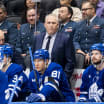Sidney Crosby turned 30 on Monday, and it is remarkable how closely his scoring totals compare to those of Mario Lemieux and Jaromir Jagr at the same age, and how they're not terribly far behind those of Wayne Gretzky, the NHL's all-time scoring leader.
Comparing Crosby to legends at age 30
How stats of Penguins center stack up against Gretzky, Jagr, Lemieux

© Bruce Bennett/Getty Images
By
Rob Vollman / NHL.com Correspondent
RELATED: [Crosby believes Penguins can three-peat | Crosby's dryer takes cake during 30th birthday celebration | Crosby's top 30 moments]
The Pittsburgh Penguins center has 1,027 points (382 goals, 645 assists) in 782 NHL games. That doesn't appear to be particularly notable because there are 11 players who had more points than Crosby prior to their age-30 seasons, including Gretzky, who had 1,979 (677 goals, 1,302 assists) in 847 games; Lemieux, who had 1,211 (494 goals, 717 assists) in 599 games; and Jagr, who had 1,158 (470 goals, 688 assists) in 875 games.
This count is based on a search at Hockey-Reference.com, which defines a player's age-30 season as the one when he turned 30 on or prior to Feb. 1. Because Gretzky turned 30 on Jan. 26, 1991, he deserves credit for the first part of the 1990-91 season, when he had 93 points (29 goals, 64 assists) in 48 games, for a total of 2,072 points (702 goals, 1,366 assists) in 895 games. Jagr, born Feb. 15, 1972, should have the portion of his 2001-02 scoring that occurred after his 30th birthday removed, which is 28 points (13 goals, 15 assists) in 23 games, for a total of 1,130 points (457 goals, 673 assists) in 852 games.
However, with the exception of Jagr, the players ahead of Crosby did the bulk of their scoring in the 1980s, when NHL scoring rates were much higher. If they had been playing in Crosby's era, they likely would have scored fewer points.
It's impossible to know how many points Gretzky and the others would have scored if they made their NHL debut in 2005-06 like Crosby, but one way to estimate it is to divide each player's scoring by the League's average goals per game in the given season and multiply it by the modern standard.
It's not a perfect approach, because a variety of factors can impact scoring, such as rule changes over the years, the number of teams of varying quality, and the average ice time per game for top forwards, especially on the power play. But this type of adjustment is a reasonable starting point.
From this perspective, Crosby is no longer in a block of a dozen players but in more select company. He ranks third at age 30 with an era-adjusted 998 points (377 goals, 622 assists), well ahead of Lemieux, who is in fourth with 899 points (365 goals, 534 assists). Gretzky is in first with 1,479 points (495 goals, 984 assists) in 896 games, followed by Jagr with 1,018 points (414 goals, 604 assists) in 858 games. (Adding to the distinction of being in the top four with Gretzky, Jagr and Lemieux: Those are the only three players to win the Art Ross Trophy as the League's top scorer in the 21 seasons from 1980-81 to 2000-01.)
The nagging issue with this approach is that it fails to take into account the significant difference in power-play time. We don't have a record of how much time players spent with the man-advantage prior to 1997-98, but we do know that it was much higher in Gretzky's day than it is today. The average NHL team had 366 power-play opportunities in 1990-91, which is 49.4 percent more than the 245 in 2016-17. According to Hockey-Reference.com, Gretzky was on the ice for 70 power-play goals that season, which is 61 percent more than Crosby, who was on for 43 last season.
However, if we break down a player's scoring totals by manpower situation, and make the era-adjustment separately for even-strength, power-play and shorthanded scoring, the totals are very similar to the numbers above. Gretzky's era-adjusted totals decline from 1,479 points to 1,440; Jagr's increase from 1,018 to 1,040; Crosby's drop from 998 to 989; and Lemieux's go down from 899 to 854. (Lemieux seems to have fallen back from the pack, but his average of 1.43 points per game puts him second to Gretzky at 1.61 and ahead of Crosby at 1.26 and Jagr at 1.19.)
So, the good news for Crosby is that his numbers do compare closely with the highest-scoring players in history, even if we adjust them. Like Crosby, each of these players won the Stanley Cup multiple times by age 30 and was at one point a perennial winner of, or finalist for, the Hart Trophy (MVP) and Art Ross Trophy, and a frequent member of either the NHL First or Second All-Star Team.
If there's any bad news for Crosby, it's that none of these players won the Stanley Cup again, and only Lemieux won the Hart after turning 30 (1995-96, at 30). Between the three of them, they won the Art Ross four more times and were named to the NHL First All-Star Team four more times. Essentially, the majority of their team-based and individual success was behind them.
Given the arrival of Connor McDavid of the Edmonton Oilers, who beat out Crosby for the Art Ross, the Hart and a spot on the NHL First All-Star Team last season at age 20, it's possible Crosby's awards and honors will start to dry up too.

















